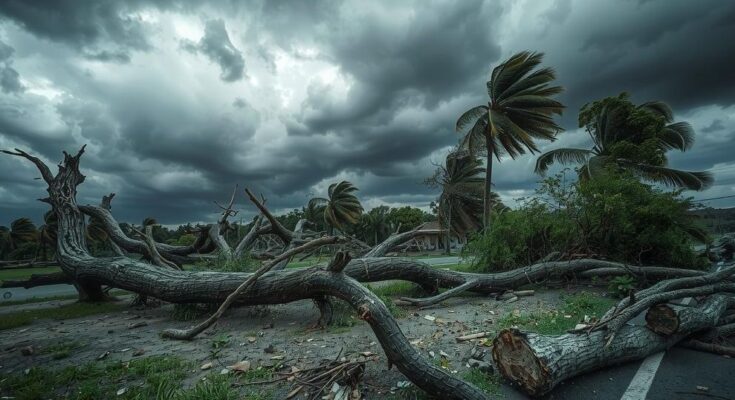Tropical Cyclone Chido has devastated southeast Africa, particularly Mayotte and Mozambique, leaving thousands dead and many without homes. The cyclone intensified rapidly before landfall, with dire humanitarian implications, including a cholera outbreak risk. Over 174,000 people are affected, and the catastrophe highlights the vulnerability of low-income communities in the face of climate change.
The devastating impact of Tropical Cyclone Chido, which formed in the southwest Indian Ocean, has left Southeast Africa in turmoil, particularly affecting Mayotte and Mozambique. Thousands are feared dead, and extensive destruction has rendered many homeless and without means of livelihood. The cyclone underwent rapid intensification before reaching land, briefly weakening before regaining a destructive Category 4 status.
Local authorities in Mayotte are uncertain of the disaster’s full extent but predict that the death toll could reach several hundred or even thousands. Initial reports indicated at least 22 fatalities and over a thousand injuries, with many areas still inaccessible. Tragically, some victims were buried before their deaths could be officially counted. In response, the French government implemented a curfew to maintain order while aid operations commence.
Médecins du Monde (MDM) has raised alarms about a cholera outbreak on the island, warning that it could escalate into an epidemic without adequate access to clean water. Concurrently, reports from Mozambique confirm the deaths of at least 34 individuals, while the Comoros has declared a week of national mourning as fatalities are expected to soar.
The U.N. Office for the Coordination of Humanitarian Affairs indicates that over 174,000 people have been impacted in Mozambique alone, with Malawi and the Comoros also bearing the brunt of the cyclone’s fury. Météo-France noted that Cyclone Chido is the most powerful cyclone to strike Mayotte in over 90 years, resulting in extensive devastation due to the region’s low-income communities’ vulnerability.
While Mauritius has reported no casualties, significant infrastructure damage has occurred. The possible influence of climate change on the cyclone’s intensity remains under examination, although rising Indian Ocean temperatures are believed to have contributed to Chido’s severity. Meteorologists emphasize that the trend of increasing cyclone intensity aligns with expectations regarding climate change, signaling serious implications for small island nations.
In conclusion, Tropical Cyclone Chido has caused catastrophic damage in Southeast Africa, particularly in Mayotte and Mozambique, with thousands feared dead and extensive displacement. The rise in cholera cases and food shortages further complicates the humanitarian crisis, exacerbated by a combination of climate change impacts and the vulnerability of local communities. Efforts to provide immediate relief are underway, but the long-term consequences of climate change on regional cyclones remain a pressing concern.
Original Source: news.mongabay.com




